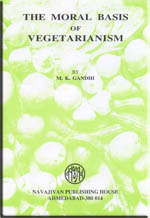
P.O. SEVAGRAM, DIST.WARDHA 442102, MS, INDIA. Phone: 91-7152-284753
FOUNDED BY MAHATMA GANDHI IN 1936
Towards New Education

THE MORAL BASIS OF VEGETARIANISM
Written by :M. K. Gandhi
Table of Contents
- Food Values
- Unfired Food
- Vital Need for Research
- Vegetarianism
- Not An End in Itself
- The Moral Basis of Vegetarianism
- Our Daily Diet
- Minimum Diet
About This Book
Written by : M. K. Gandhi
First Edition :10,000 copies, 1959
I.S.B.N :81-7229-122-1
Printed and Published by : Jitendra T. Desai
Navajivan Mudranalaya,
Ahmedabad - 380 014,
India.
© Navajivan Trust, 1959
Download
Chapter-5: Not An End in Itself
Abstemiousness from intoxicating drinks and drugs, and from all kinds of foods, especially meat, is undoubtedly a great aid to the evolution of the spirit, but It is by no means an end in itself. Many a man eating meat and with everybody living in the fear of God is nearer his freedom than a man religiously abstaining from meat and many other things, but blaspheming God in every one of his acts.
Young India, 6-10-21
Abjure brinjals or potatoes by all means, if you will, but do not for heaven’s sake begin to feel yourself self-righteous or flatter yourself that you are practicing Ahimsa on that account. The very idea is enough to make one blush. Ahimsa is not a mere matter of dietetics, it transcends it. What a man eats or drinks matters little; it is the self-denial, the self-restraint behind it that matters. By all means practice as much restraint in the choice of the articles of your diet as you like. The restraint is commendable, even necessary, but it touches wide latitude in the matter of diet and yet may be a personification of Ahimsa and compel our homage, if his heart overflows with love and melts at another’s woe, and has been purged of all passions. On the other hand, a man always over scrupulous in diet is an utter stranger to Ahimsa and a pitiful wretch, if he is a slave to selfishness and passions and is hard of heart.
Young India, 6-9-1928
I am painfully aware of the fact that my desire to continue life in the body involves me in constant himsa. That is why I am becoming growingly indifferent to this physical body of mine. For instance, I know that in the act of respiration I destroy innumerable invisible germs floating in the air. But I do not stop breathing. The consumption of vegetables involves himsa, but I find that I cannot give them up. Again, there is himsa in the use of antiseptics, yet I cannot bring myself to discard the use of disinfectants like kerosene, etc. to rid myself of the mosquito pest and the like. I suffer snakes to be killed in the Ashram when it is impossible to catch them and put them out of harm’s way. I ever tolerate the use of the stick to drive the bullocks in the Ashram. Thus there is no end of himsa which I directly and indirectly commit. If, as a result of this humble confession of mine, friends choose to give me up as lost I would be sorry, but nothing will induce me to try to conceal my imperfection ion in the practice of Ahimsa. All I claim for myself is that I am ceaselessly trying to understand the implications of great ideals like Ahimsa and to practice them in thought, word and deed and that not without a certain measure of success as I think. But I know that I have long distance yet to cover in this direction.
Young India, 1-11-1928